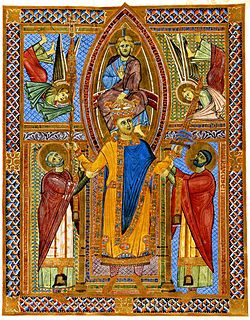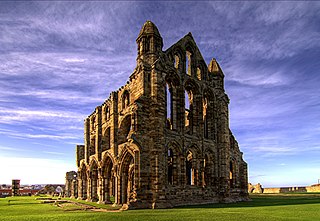Related Research Articles

Year 765 (DCCLXV) was a common year starting on Tuesday of the Julian calendar. The denomination 765 for this year has been used since the early medieval period, when the Anno Domini calendar era became the prevalent method in Europe for naming years.

Year 1002 (MII) was a common year starting on Thursday of the Julian calendar.

Year 713 (DCCXIII) was a common year starting on Sunday of the Julian calendar. The denomination 713 for this year has been used since the early medieval period, when the Anno Domini calendar era became the prevalent method in Europe for naming years.

Year 664 (DCLXIV) was a leap year starting on Monday of the Julian calendar. The denomination 664 for this year has been used since the early medieval period, when the Anno Domini calendar era became the prevalent method in Europe for naming years.
Ecgric was a king of East Anglia, the independent Anglo-Saxon kingdom that today includes the English counties of Norfolk and Suffolk. He was a member of the ruling Wuffingas dynasty, but his relationship with other known members of the dynasty is not known with any certainty. Anna of East Anglia may have been his brother, or his cousin. It has also been suggested that he was identical with Æthelric, who married the Northumbrian princess Hereswith and was the father of Ealdwulf of East Anglia. The primary source for the little that is known about Ecgric's life is Historia ecclesiastica gentis Anglorum, written by the English Benedictine monk Bede in around 731 AD.

Ælfwald was an 8th-century king of East Anglia, an Anglo-Saxon kingdom that today includes the English counties of Norfolk and Suffolk. The last king of the Wuffingas dynasty, Ælfwald succeeded his father Ealdwulf, who had ruled for 49 years. Ælfwald himself ruled for 36 years. Their combined reigns, with barely any record of external military action or internal dynastic strife, represent a long period of peaceful stability for the East Angles. In Ælfwald's time, this was probably owing to a number of factors, including the settled nature of East Anglian ecclesiastical affairs and the prosperity brought through Rhineland commerce with the East Anglian port of Gipeswic. The coinage of Anglo-Saxon sceattas expanded in Ælfwald's time: evidence of East Anglian mints, markets, and industry are suggested where concentrations of such coins have been discovered.
Oslac was a King of Sussex. He reigned jointly with Ealdwulf and Ælfwald, and probably also Oswald and Osmund.
Ealdwulf was a King of Sussex, but is known only from his charters. He reigned jointly with Ælfwald and Oslac.
Ælfwald was a King of Sussex, who reigned jointly with Ealdwulf and Oslac, and probably also with Oswald and Osmund.
The Saints are a group of villages in the north of the English county of Suffolk, between the rivers Blyth and Waveney near to the border with Norfolk. The villages are all named after a saint, and either South Elmham or Ilketshall named after the 'hall of Alfkethill'. Known by locals as 'up the Parishes' the area is found between the market towns of Halesworth, Harleston, Bungay and Beccles. During World War II signposts were removed which resulted in many US Airman having difficulty finding the way back to RAF Bungay at Flixton and other local airfields including Metfield.
Ealdwulf was a medieval Abbot of Peterborough, Bishop of Worcester, and Archbishop of York.
Hygeberht was the Bishop of Lichfield from 779 and Archbishop of Lichfield after the elevation of Lichfield to an archdiocese some time after 787, during the reign of the powerful Mercian king Offa. Little is known of Hygeberht's background, although he was probably a native of Mercia.
Ealdwulf was king of East Anglia from c. 664 to 713. He was the son of Hereswitha, a Northumbrian princess, and of Æthilric, whose brothers all ruled East Anglia during the 7th century. Ealdwulf recalled that when he was very young, he saw the Christian temple belonging to his ancestor Rædwald.

Eni or Ennius was a member of the Wuffing family, the ruling dynasty of the kingdom of East Anglia. He was the son of the semi-historical pagan king Tyttla and the brother of Rædwald, who both ruled East Anglia.
Hereswith or Hereswitha, also spelt Hereswithe, Hereswyde or Haeresvid, was a 7th-century Northumbrian saint. She married into the East Anglian royal dynasty and afterwards retired to Gaul to lead a religious life. Hereswith's sister was Saint Hilda, founder of the monastery at Whitby. Details of her life and identity come from Bede's Historia Ecclesiastica, the Anglian collection and the Lives of Edwin of Northumbria and Hilda of Whitby.
Eardwulf or Eardulf is an Anglo-Saxon male name. Notable people with the name include:
Ealdwulf was a medieval Bishop of Lichfield.
Eadwulf is an Anglo-Saxon male name. Notable people with the name include:
Aldwulf or Ealdwulf was a medieval Bishop of Rochester. He was probably consecrated in 727 and died in 739. According to Bede his consecrator was Archbishop Berctwald.
Ealdwulf is a male given name used by:
References
- ↑ Fryde, E. B.; Greenway, D. E.; Porter, S.; Roy, I. (1996). Handbook of British Chronology (Third revised ed.). Cambridge: Cambridge University Press. ISBN 0-521-56350-X.